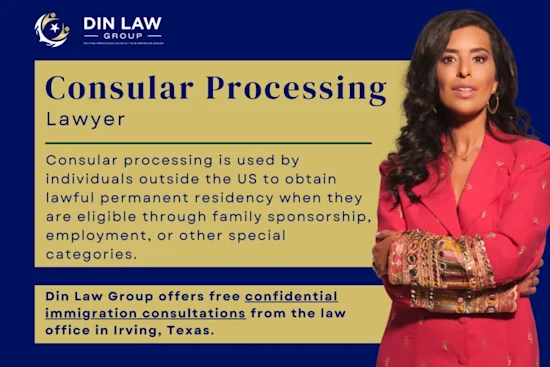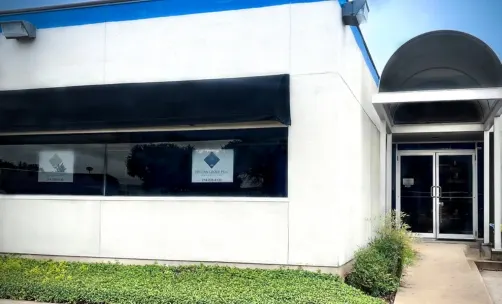Consular Processing
Discover seamless Consular Processing solutions with Din Law Group.
If you are not currently living in the United States, and wish to submit an immigrant visa petition, you will need to go through a process called consular processing.
People who are already living in the U.S. who want to apply for a green card, go through a process called adjustment of status.
Navigating the Immigration and Nationality Act (INA) is challenging without the help of an experienced immigration attorney. Din Law Group has practiced immigration law exclusively since 2012. Lead immigration attorney Asma Din has the resourcefulness, experience, and life experience to help qualified immigrants attain their green cards whether they’re already living in the U.S. or applying from abroad.
Table of Contents
Google Review – Bhimi Rajesh

Request A Free Consultation Today!
Don't risk your future by navigating immigration complexities and processes alone. Trust an immigration attorney for guidance.
What is Consular Processing?
Consular processing is the method of applying for a green card from outside of the United States at a U.S. embassy or a U.S. Department of State consulate.
From submitting initial forms and evidence to the medical exam to the immigration interview, when using consular processing, it all takes place outside the United States.
Consular Processing: How to Start
Most immigrants become eligible for a green card through a petition filed by their employer or a family member. Some become eligible for a green card through other special situations. Some humanitarian programs don’t require immigrant petitions, but typically, the process of attaining a green card begins with an immigrant petition.
If the immigrant petition is approved by U.S. Citizenship and Immigration Services (USCIS) and you live outside of the country, USCIS will send the approval to the Department of State’s National Visa Center (NVC). Then, you and your immigration attorney wait until an immigrant visa number becomes available.
Waiting for Notification from the National Visa Center
The NVC will notify both you and the petitioner (or just you if you qualified for self-petitioning) as soon as they receive the visa petition. After that, the next notification from the NVC is usually to let you know that an immigrant visa number has become available. Your immigration attorney will help you through this process. Your attorney will explain when the visa processing fees are due and help you submit them.
You won’t usually need to contact the NVC, because they will contact you as needed. You must let your attorney know to inform the NVC if your address changes, your marital status changes, or any life changes happen that could affect your eligibility.
Get The Immigration Help You Deserve And Request A Consultation Today!
Consular Processing Interview Appointment
When a visa becomes available or if your priority date is current, the consular office will schedule a date for your interview.
As soon as you get this notification, it’s very important to consult with your immigration attorney and prepare.
Before your interview, it’s important to take some steps to improve your chances of the interview going well. You should have a medical examination done beforehand and make sure all your vaccinations are up to date.

Carefully check to see what items you must bring to your interview. At a minimum, you will need to bring:
- The NVC appointment letter
- A copy of the petition as it was filed
- Your passport (make sure it has not expired)
- Two identical photographs
- The results of your medical exam
- Two copies and English translations of all documents and forms
- Payment for any fees
Documents that need to be translated into English and duplicated that you may need to bring include:
- Marriage certificates
- Military record
- Police certificates
- Ten years’ worth of employment information
- A list of all your former addresses
- Birth certificate
- Divorce decree or death certificate if you must prove termination of a previous marriage
Remember, any document that is not in English must be translated into English and certified.
After Your Interview
It’s important not to make any major or permanent changes during this process. For example, don’t sell your home or quit your job until you are sure that you have secured a visa. A consular officer will let you know if your application is approved or denied.
The Visa Packet
If you are granted an immigrant visa, you must pay a USCIS Immigrant Fee to process your immigrant Visa Packet. You can pay the fee online and your immigration attorney can help. You must pay this fee before you leave for the United States.
If you are granted an immigrant visa, you will receive an information packet called a “Visa Packet” from your consular officer. This will be sealed. You should not open this packet. It is to be given directly to the U.S. Customs and Border Protection (CBP) officer at the port of entry when you arrive.
Arriving at the Port of Entry
When you get to the port of entry, a CBP officer will inspect you. The officer will look at your unopened visa packet and speak with you to determine whether to let you in as a lawful permanent resident.
When they admit you, you will have completed the process and be a lawful permanent resident. Your actual green card will come in the mail after you have arrived in the United States.
Get The Immigration Help You Deserve And Request A Consultation Today!
Frequently Asked Questions About Consular Processing
Not every visa is approved. Sometimes, people don’t provide enough information at their immigration interview. Other times, officials learn that someone has a specific situation that makes them ineligible. For example, if officials learn of a previous immigration violation, a previous removal, a criminal conviction, an error in labor certification approval, an infectious disease, or a security risk, they will deny an immigrant visa.
In some cases, an experienced immigration attorney may find a remedy for your ineligibility such as a waiver.
Even if you already have a visitor visa in hand, visiting the U.S. during consular processing is unwise. Even a short trip could result in your application being flagged for administrative review. This would be a huge setback and result in more screening. A short visit to the United States, even to visit your spouse, could delay your immigrant visa months.
In the past, a young person in consular processing could lose the opportunity for an immigrant visa petitioned by a parent once they turned 21. The Child Status Protection Act now offers protections against aging out if it’s due to long visa wait times.
Consular processing is typically significantly faster than Adjustment of Status.
The U.S. State Department has a list of U.S. consulates and embassies around the world. Your attorney can also help you.
The U.S. limits the number of immigrant visas available in some categories. When a category has a limited number of visas available, the date your petition was filed is your priority date.
Choose an Immigration Attorney Experienced with Consular Processing
If you are outside the United States seeking an immigrant visa, you need an immigration attorney that understands consular processing. Many times, the U.S. citizen of green card holder sponsoring the immigrant visa will meet with the attorney inside the United States on behalf of the immigrant abroad. Din Law Group offers free confidential immigration consultations from the law office in Irving, Texas.




